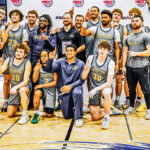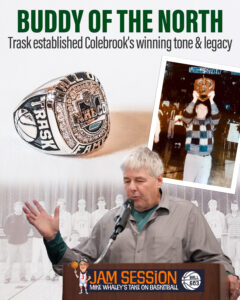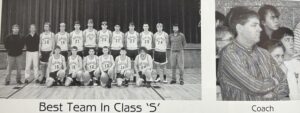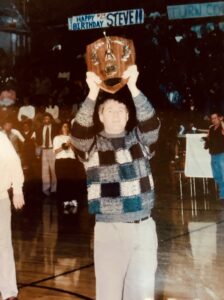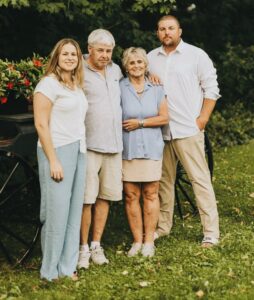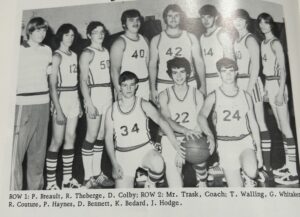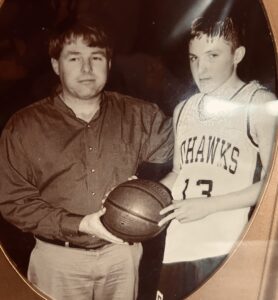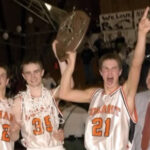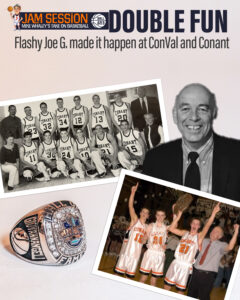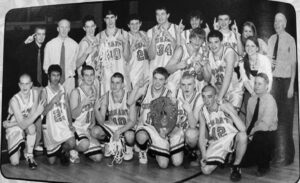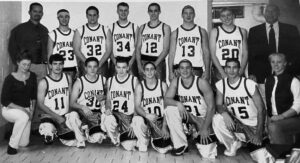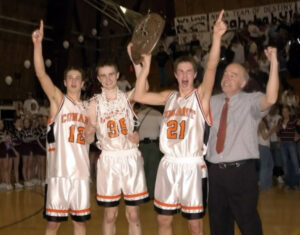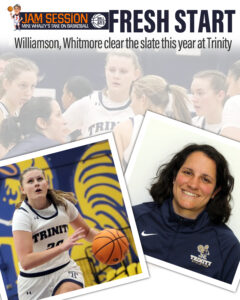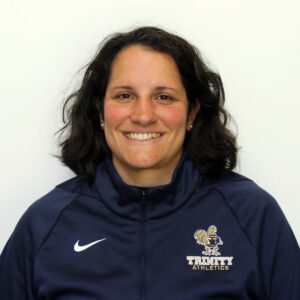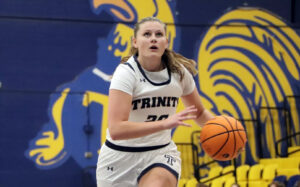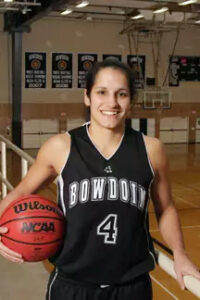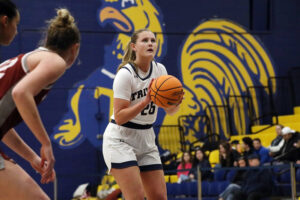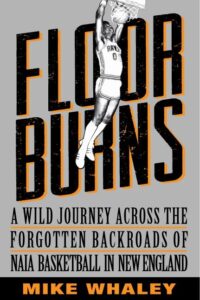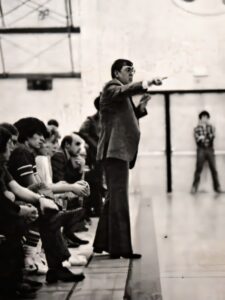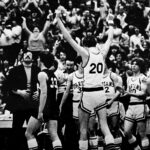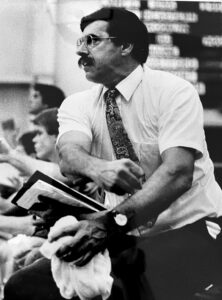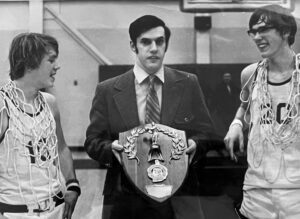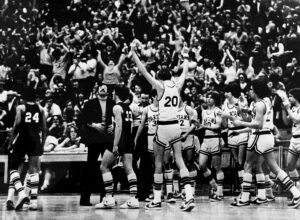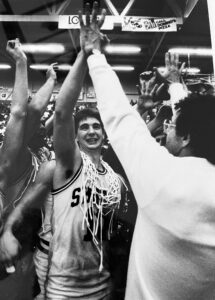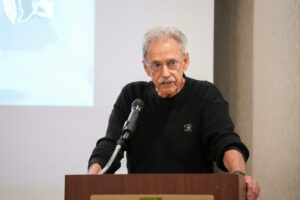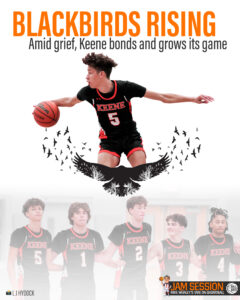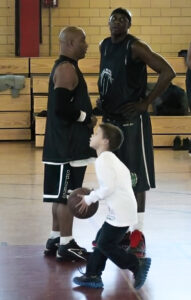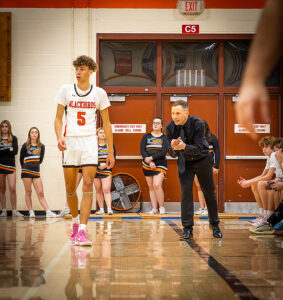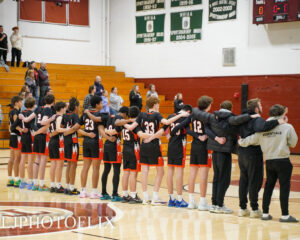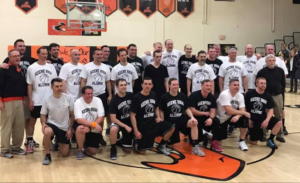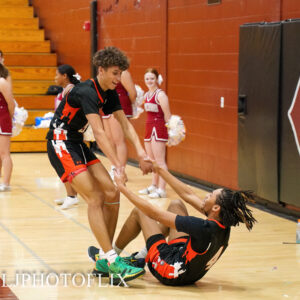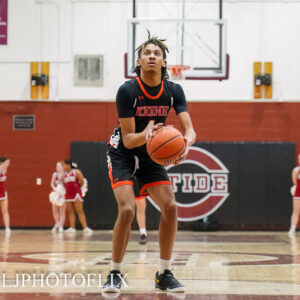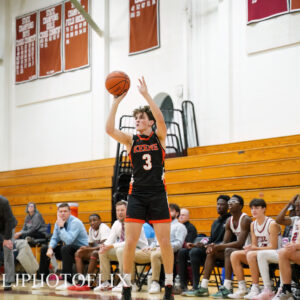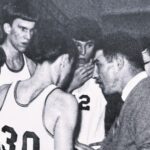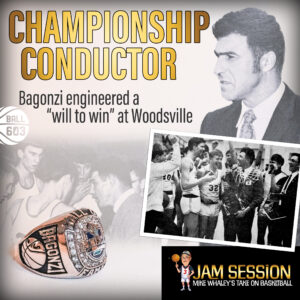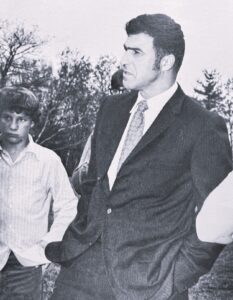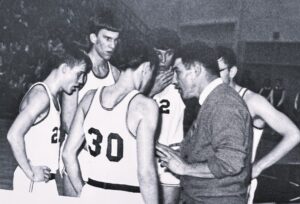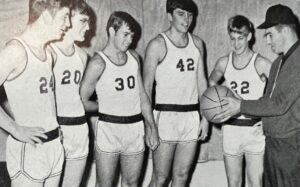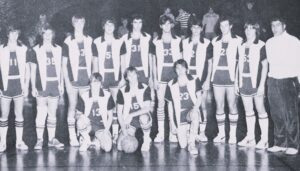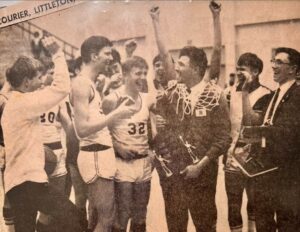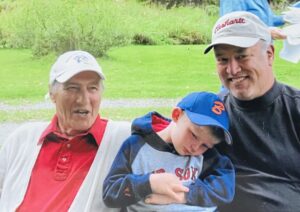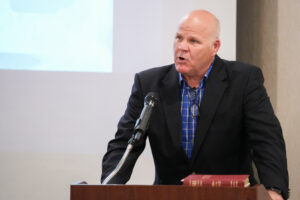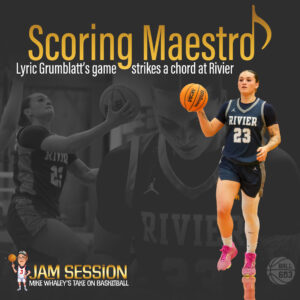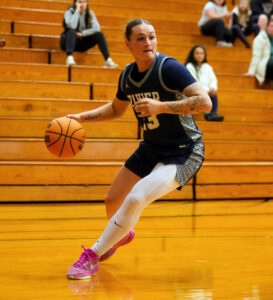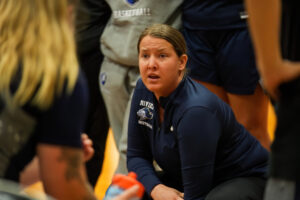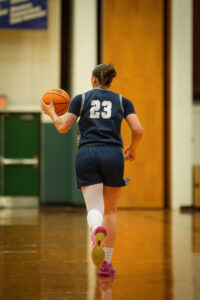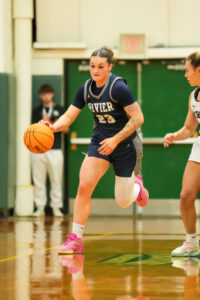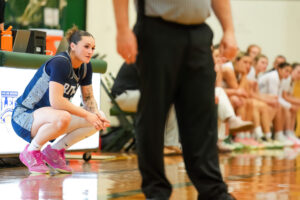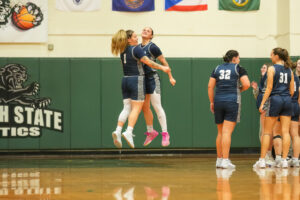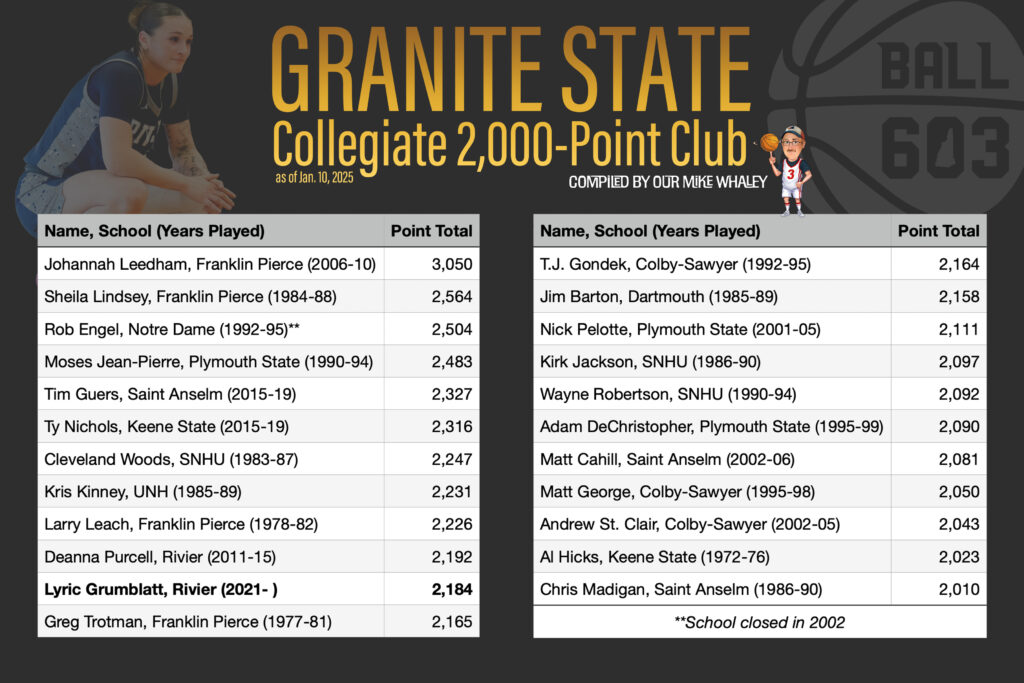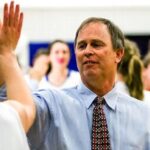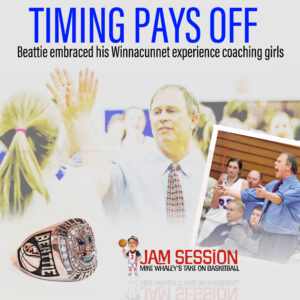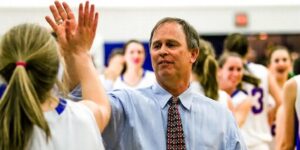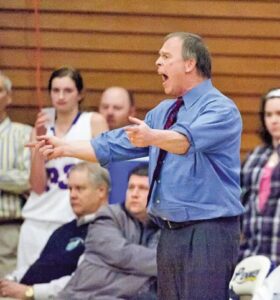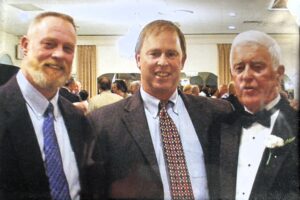By: Mike Whaley
 A direct route to your final destination is not always the way it goes. How about the paths taken by four key players for the conference champion Great Bay Community College men’s basketball squad? Three started at other schools before winding up at GBCC, while a fourth began there fresh out of high school, left for two years, but now is back. All four are playing key roles as the Herons prepare for their second trip to the United State Collegiate Athletic Association (USCAA) Division II Tournament, set for March 11-15 in Buffalo, New York.
A direct route to your final destination is not always the way it goes. How about the paths taken by four key players for the conference champion Great Bay Community College men’s basketball squad? Three started at other schools before winding up at GBCC, while a fourth began there fresh out of high school, left for two years, but now is back. All four are playing key roles as the Herons prepare for their second trip to the United State Collegiate Athletic Association (USCAA) Division II Tournament, set for March 11-15 in Buffalo, New York.
Great Bay is currently in the midst of the finest season in program history. On Sunday, the Herons captured their first Yankee Small College Conference playoff championship with a 71-55 win over VTSU-Randolph to improve to a school-record 22-5. No. 4 GBCC opens up the nationals on Wednesday, 10:30 p.m., in Buffalo against No. 5 Penn State Schuylkill in the Elite Eight.
Two years ago, the Herons barely qualified for their first national tournament as the 10th and final seed. But they made some noise with two upset wins to make the USCAA Final Four before they were eventually eliminated. Last year the team went 18-8 and lost in the conference semis.
All-Conference forward Theo Wolfe, a 6-5 senior, originally came to New England from Kissimmee, Florida, in 2019, spending a year at UMaine-Machias with some ex-AAU teammates. He returned to Florida when the school’s athletic programs were suspended during the Covid-19 pandemic. They are still suspended. Junior Mpore “MP” Semuhoza went from Deering High School in Portland, Maine, to Central Maine CC, where he had a solid first year, but was looking for something else. Keith Landry, a 6-5 senior forward, graduated from Belmont High School in 2020, enrolled at Plymouth State University, but was cut from the basketball team. Ethan May headed to Great Bay in 2019 from Londonderry High School, played two years and then moved on with his life equipped with a welding certificate.
All four eventually ended up at, or back, at Great Bay. It is impossible to imagine the Herons’ current run of success without them – or without the deepest team in the conference. “We rotate 10 guys, so there’s plenty of contribution going on,” coach Alex Burt said. “Other (teams) might go 6, 7, 8 (deep), we generally go 10.”
May might just have been the missing piece on this year’s team as a quality secondary scorer and a veteran defensive stopper. He played two years at Great Bay (2019-20, 2021, 22), sandwiched around a missed Covid year. Once he had his welding credentials he felt he was ready to move on. It had been a difficult three years juggling a commuter school’s academic schedule, basketball and working full time. “It was hectic. I thought I was just ready for life,” he said.
It turns out he wasn’t. He was away for two years working, but his basketball passion was still there pulsating in the background. “I was coming to games,” May said. “I saw them get smacked by NHTI (in the 2024 conference semifinals, 95-78). I played pickup and stuff. I still kept relatively with it. It’s always been my first love. I’m a defensive guy. So (it was tough) to see them get smacked because of defense. I was in the stands rubbing my knees; like, man, I want to get out there.” He was convinced he needed to return to Great Bay.
Semuhoza, at 6-4 forward, went from high school to Central Maine CC. in 2022-23. He played 13 games, averaging a very solid 7.9 points and 5.8 rebounds per game as a freshman. He had some buyer’s remorse because Burt had recruited him out of high school. “I just felt like Great Bay would work better for my game,” he said. “I felt like I was something Great Bay needed at the time, like a spark. He (Burt) gave me a chance and I appreciate Coach for that.”
Landry went to Plymouth, but got cut from the team in 2020. “Burt reached out the next day asking if I wanted to come run with the team and see if I liked it here,” he said.
Burt said Landry “was a kid I had on my radar in the past. I didn’t care if I was Plan A or Plan B, for anyone really. I just know who I want and when they’re ready to come to me, I give them everything I’ve got. It’s been a long-term relationship.” Landry has played four years, which is allowed, even though Great Bay and many colleges in the YSCC are two-year institutions.
When Wolfe left UMaine-Machias after one season in 2020, he thought he was all done with basketball. “I put down the basketball and started pursuing some other things, pursuing photography,” he said. One of Wolfe’s old teammates returned north to play for Great Bay. He reached out to Wolfe and eventually Wolfe reached out to coach Burt. He remembered Great Bay from his Machias days. “I really admired the way they were moving the ball and the way they were playing as a team,” he said. After two years away from the game, Wolfe was ready for a comeback at Great Bay. “I gave up basketball and Coach kind of talked me back into it,” he said.
The impact of these four players this year has been evident. “Ethan May was the x-factor,” said Wolfe. “I wholeheartedly believe if it were not for Ethan May we would not be where we’re at.” Wolfe noted that in the championship game, May held Randolph star Jaylon Calvin to seven first-half points that allowed Great Bay to jump out to a 35-27 lead at the half and eventually pull away in the second half to claim their first conference championship.
“He’s definitely our hidden gem defensively,” coach Burt said of May. “He’s a winner at heart. He’s willing to do whatever it takes for the team. He was ready to dive back in and give a little more for the guys around him.”
May wasn’t initially sure if he was going to go back to Grreat Bay, and then when he did, he wasn’t sure what he would be able to bring to the table. He was part of a team reset that pulled the team together after an 0-2 start. “To see it unfold and everyone understand what they needed to bring,” May said. “It was amazing to see. We put our egos aside and did exactly what we needed to do.” The Herons rattled off 14 straight wins.
It took May a while to regain the old confidence. By mid January he started to see remnants of his former self. “It was tough getting that rhythm and flow back and feeling confident in my shot,” he said. “I was zero percent from 3 the first semester. It was good for myself to finally see that ball go in. I started to get more confident.” His stat line is quite tidy: 9.3 points, 4.5 rebounds, 4.2 assists, and 2.5 steals per game.
“He really painted the picture of what the program could be with us trying to be more defensive,” said Burt of May’s return to Great Bay, which came at a time when the team was switching its emphasis to defense. “Thankfully he was ready to go. He was guarding the best guards, the best wings, literally every single night. We were asking him to cover ridiculous tasks. He was just more than willing, more than able to do it.”
Semuhoza came in last year and had an immediate impact averaging 12.3 points and 5.4 rebounds per game. The Herons went 18-8, but lost in the conference semis. This year, he has been one of the main guys – second in scoring (15.6) and rebounding (8.6), which has helped to soften the blow of losing a pair of big scorers in All-American Kingsley Breen and Bryce Gibson. “I’m kind of an all-around guy and one of our leaders,” said Semuhoza, who was named All-YSCC Second Team.
“MP made a massive jump from last year to this year with his belief in what I was trying to do with the team,” said coach Burt. “He fit in with that.”
Landry has grown in his four years to the point he is now a veteran, a captain and one of the team’s key players. “I’m definitely more involved in the offense and I’m one of the primary defenders,” said Landry, who is averaging 7.7 points, 3.8 rebounds and 2.3 assists per game. “I definitely needed to space the floor for people like Theo and MP to make life easier for those guys.”
Wolfe has been a great three-year player for the Herons, scoring a school record 1,475 points. As good as his first two years were, this season he was even better. He led the nation and the YSCC in scoring (24.9 ppg), and was tops in the YSCC in rebounding (12.2) and second in the nation. He was named All-YSCC First Team. “We were a little motivated by that (losing in the semis last year),” he said. There was also a sense of urgency to find success because it was his last year.
Burt has seen Wolfe’s game expand in three years. “Theo has gained a stronger understanding of how to be effective,” the coach said. “There are times we need him inside, on the outside, off the ball, on the ball. He’s grown tremendously as a person and a player.”
All four were pivotal in Sunday’s championship win over Randolph. Wolfe led the way with 18 points and 13 rebounds. Landry sparked the Herons in the first half with 14 of his 17 points, making 5-of-8 3-pointers in the game. Semuhoza did not score in the first half, but he stayed composed and helped in the second half, ending with seven points and eight boards. May did a nice job defending Randolph’s Calvin, making him work for his 18 points. He also scored 12 points of his own, 10 coming in the second half. May and Semuhoza split eight points during a devastating late 13-0 run that built the lead to 71-50 in the final minute to put the game on ice.
Landry was laser focused on Sunday, especially after what happened in the semis last year against NHTI. It was personal. “It was my birthday,” he said. “I couldn’t lose on my birthday. I lost on my birthday last year to NHTI (by 18 points). I just couldn’t lose on my birthday again.” And by winning, Landry (and the Herons) got the best birthday basketball gift of all – a bid to the nationals.
Mike Whaley can be reached at whaleym25@gmail.com
Check out a full photo gallery of the YSCC title game by Michael Griffin…


